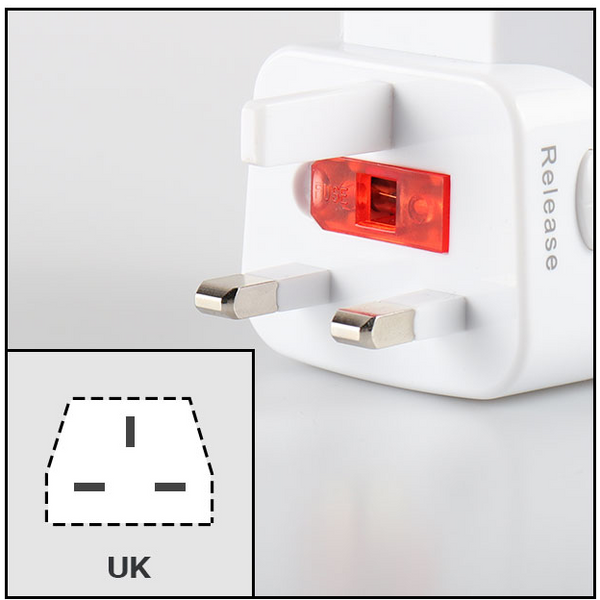A new year is underway and travel is on everyone's mind. Gadgets and gizmos for travel can only get you as far as their battery life, and that's why many people rely on a Universal Travel Adapter.
But, how "universal" are these adapters, really? And, how do we know which types of adapter the plug sockets we are travelling to will need?
How Does A Universal Travel Plug Adapter Work?
Travel adapters are mains-compatible electronic devices that physically convert a socket of one shape, or "type" to another! Sometimes this is as simple as adding a USB port to a mains socket, but other times the travel adapters actually convert one socket type to another from a different country of origin.
In general, plug sockets work by delivering power to specially designed and shaped contacts, which are present inside plugs for devices from that country. In the UK, that's the 3-prong plugs we use for everything from TVs to Kettles. Power runs in to the plug and out through the cable to boil your water.
There's a whole other layer to power delivery which involved how many circuits your home is on, and thus how many different types of sockets of each volt / amp you have, but that's an issue for another blog!
A travel adapter simply plugs in using the appropriate pins or prongs, and then configures the other side of the adapter to a different plug type. Power travels in to the adapter, then out to the plug of your device, and then out again along the cable to the device itself!
By adding this extra step, a travel adapter allows us to convert plug types easily while travelling.
Universal Plug Socket Types
The complete list of plug configurations across the world is registered most commonly as "Types". These are differently shaped, and sometimes support slightly different voltage and amperage, too.
The types span from "Type A" to "Type O", and as the quick-thinkers will have already worked out, that's a total of 15 plug types!
With 15 different plugs it's unreasonable to assume a Universal Travel Adapter is, actually, universal surely? Well, thanks to some overlap within the types themselves you can get surprisingly close to worldwide coverage with a single adapter! For a full run down of every single type visit the amazing map at World Plugs.
If you've ever wondered are Dubai plugs the same as UK ones, then your answer is right there; Dubai use Type G and Type M (both 3-pin plugs) and comparing that to the UK shows we also use Type G! Therefore, your standard UK 3 Pin chargers will work fine.
Let's see how many of those places a single adapter can cover!
Mains Plug Socket Type A

Number of Pins: 2
Locations: USA, Japan
Depending on where you're reading from, this might well be the "norm" for you. Dominating America and Japan, Type A sockets are two-pronged and use flat contacts (Rather than cylindrical or cubic) to connect devices. Make sure your US Travel adapter plug has these flat metal prongs or you might be looking at an EU version!
Mains Plug Socket Type C

Number of Pins: 2
Location: Most of Europe
Moving across the pond, Europe (With the caveat of ignoring the UK, Ireland, Cyprus and Malta) use this cylindrical 2-pin variant. While very similar to Type A, Type C is incompatible due to the entirely differently shaped contact points.
Mains Plug Socket Type E / F
Number of Pins: 2 or 3
Locations: Widespread Across Europe
These two-pin sockets are compatible with Type C, which makes adapters for Type C sockets actually incredibly versatile! A European Travel Adapter should always have Cylindrical contacts, but may have two or three. Covering most of Europe with a single adapter, and the USA / Japan with another, starts to make the world more and more accounted for.
Mains Plug Socket Type G

Number of Pins: 3
Locations: UK, Ireland, Parts of Europe, Hong Kong, Singapore
The most nostalgic for the majority here, I'd imagine. The Type G plug is the mainline UK plug socket and is used for everything from games consoles to phone chargers, hoovers to garden strimmers.
Mains Plug Socket Type I

Number of Pins: 2 or 3
Locations: Australia, New Guinea, Argentina, New Zealand
The Type I socket uses flat contacts, but arranged in an angular fashion. Rotated about 45 degrees from a Type A plug. Sometimes, there's a third flat pin creating a socket akin to a mix of Type A and Type G. For these reasons, it's possible to engineer the connections for Type I into a travel adapter alongside the others on this list!
Final Coverage List for a Travel Adapter
Using a single travel adapter that can rotate it's flathead pins and has a modular compartment to store the alternate pins (Cylindrical, cubic, etc) you can account for all the Types listed in this article!

That means you can travel across the UK, to Ireland, across all of Europe and into Japan or America then finish in Australia all using one adapter. The benefit of being able to take your own reliable tech with you and power it anywhere with your travel plug adapter makes travelling less stressful, and less expensive! No more buying cables or whole new devices just to be compatible thanks to a single worldwide travel adapter.
All pictures in this article are of the WAP150, so you can pick one up today for under £15 and secure your travel plans for years to come! Happy travelling, all.


0 comments